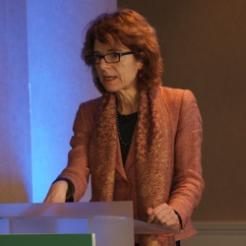The UK has moved to a “lower-productivity economy” since the recession even though employment figures have recently improved, economist Vicky Pryce told an audience of charity investors and fund managers yesterday.
Pryce was delivering the closing plenary at Civil Society Media’s 13th annual Charity Finance Investment Forum, with a speech entitled: ‘Prospects for the Eurozone and the global economy’.
She said that in the UK a lot of the new jobs that have been created recently are part-time rather than full-time and low-skilled rather than highly-skilled. Also, more people are being employed on zero-hours contracts and the number of people listing themselves as self-employed has risen sharply.
“We have moved to a lower-productivity economy,” said Pryce, who is currently employed as chief economics adviser at CEBR.
She said the deflationary environment in Europe is concerning because returns are not there for investors, but it does provide comfort for consumers because interest rates stay low and for European exporters because exchange rates are favourable.
Oil prices
She said the falling oil price is good for the world economy as a whole – “well, everybody except Russia”. When prices were nudging $140 a barrel, that put a real dampener on world growth, she said. But now oil prices are likely to remain low for the time being, which is good news because the state of the world economy “influences and affects us all”.
Pryce admitted that economists failed to predict the last global economic crisis because they “didn’t factor in the influence of the financial services sector”.
Turning to the economic recovery, she said that normally world trade begins rising first, before gross domestic product (GDP) follows, but on this occasion trade has been very sluggish. She blamed this on distrust in the financial sector: “Banks don’t trust other banks and other countries so lending for trade has been falling since the beginning of the crisis. For the developing world this is a serious problem.”
Pryce added that the financial sector is still in “huge difficulty” across Europe and is not providing the engine of growth in the region that it should. Globally we are basically relying on the US to provide growth, she said, and this is because the US did not embrace austerity as Europe did, but chose to give its economy a substantial boost through “massive amounts of quantitative easing”.
“The Eurozone goes from one crisis to another…basically the system is discredited,” she said.
“The best we can say is we may get some growth in the Eurozone economy.
“But I would say there is a 50:50 chance that the euro will not be here in 2020.”
- The Charity Finance Investment Forum took place on Monday and Tuesday at Wokefield Park, Berkshire. If your charity has funds under management of £5m or more and you would like to attend next year's event, please email [email protected].









